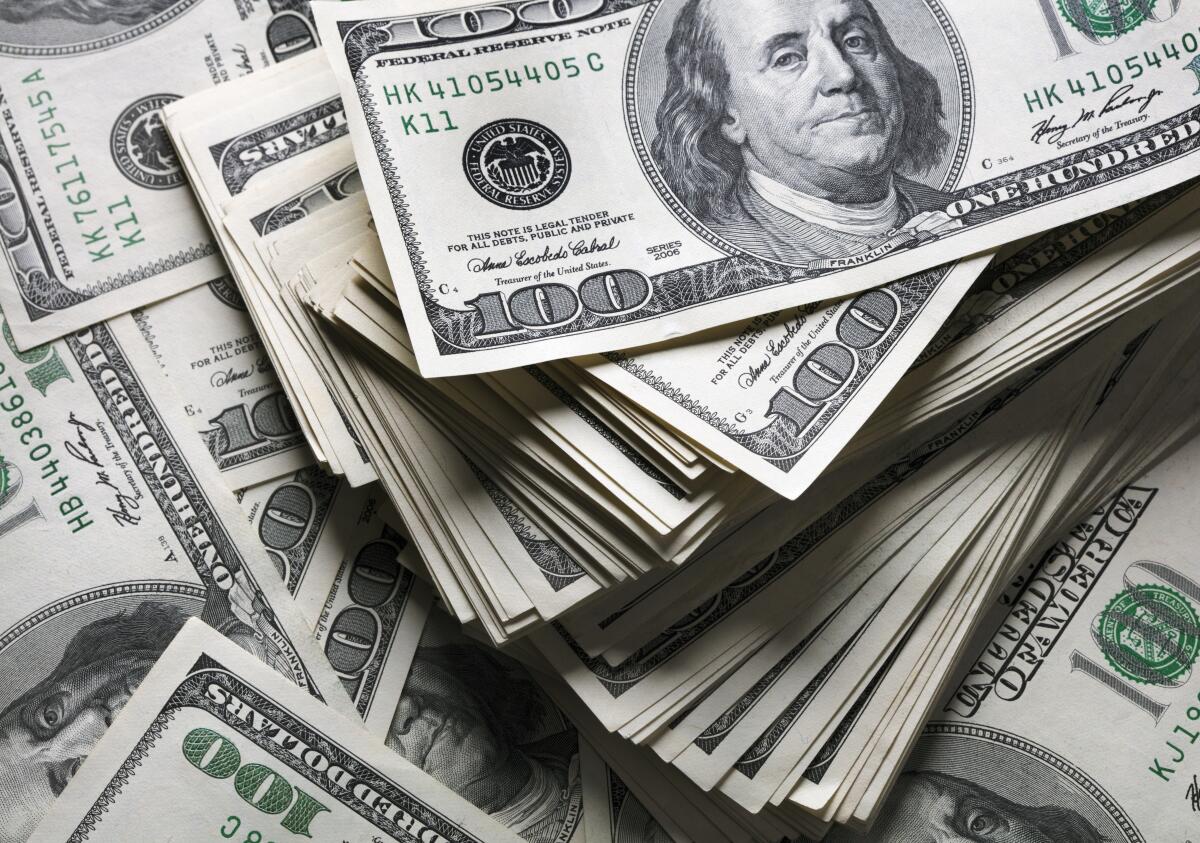Bringing lots of cash into the U.S.? Disclose to Customs or you’ll pay the price

- Share via
Carrying too much undeclared cash into the United States can land you in a world of trouble. Just ask the four American Airlines flight attendants who were arrested in October at Miami International Airport and charged with money laundering and acting as unauthorized money transmitters.
Early on Oct. 22, after arriving at Miami from Santiago, Chile, the flight attendants were subjected to a routine search by U.S. Customs and Border Protection officers. One of the flight attendants, when asked how much cash he was carrying, said he had $100, according to the Miami Herald. Moments later, the attendant was found to have $9,000.
The discrepancy prompted officers to interrogate other flight attendants from the same flight. One had $7,300, another $6,371. The cash-carrying flight attendants pointed to the fourth as the coordinator of the effort, the Herald said.
But it’s your money. Why can’t you bring it into the country?
Answer: You can, but paperwork may be involved.
Here’s what the U.S. Customs and Border Protection website writes: “It is legal to transport any amount of currency or monetary instruments into or out of the United States,” But anyone carrying more than $10,000 must declare the amount by filing a Report of International Transportation of Currency or Monetary Instruments, FinCEN Form 105.
Why the uproar? After all, none of them carried more than $10,000.
The answer: The $10,000 limit applies whether you’re traveling alone or with a group.
For example, four family members traveling together can’t decide to split $30,000 so that each person carries $7,500 into the U.S. The $30,000 must be declared.
CBP may have treated the flight attendants as a group because they were traveling together and transporting a total of $22,671.
The flight attendants may have been delivering the money to someone in the U.S., the Herald reported. If this is true, the suspects were indeed acting as unauthorized “money transmitters.” (A money transmitter is a person or business that provides money transfer services for a fee. To conduct these services, transmitters must obtain a license.)
The airline says it is working with law enforcement on the ongoing investigation.
“Travelers who fail to truthfully report all of their currency risk their currency being seized and may face criminal charges,” including fines up to $500,000 and a 10-year prison term, the CBP website writes.
When transporting cash into or out of the U.S., honesty is always the best policy. This edict was impressed on me a few years ago after a fellow flight attendant made a shocking confession on a flight from São Paulo, Brazil, to Miami.
Although we rarely socialize off the airplane, he is a good guy with whom I’ve had a great working relationship.
After we completed the meal service, he pulled me aside and whispered. “You’re not gonna believe this.”
I thought he was about to share another hookup story that begins at a São Paulo nightclub and ends in layover lore.
“OK,” I said, shaking my head. “What happened?”
“I’ve got $100,000 in my bag.”
“What?”
“Well,” he continued, pointing to the business-class closet in which his flight attendant tote had been stowed, “it’s actually a bit more than $100,000.”
He recounted how he had recently sold his São Paulo condominium. The proceeds were deposited into a Brazilian bank account. To wire the money to the U.S., the bank wanted to charge about 10% in service fees.
Rather than pay that exorbitant fee, Eddie decided to work a São Paulo trip sequence so he could pick up the cash in person.
Carrying large amounts of cash in any city is a precarious — some might say, foolish — undertaking. In Greater São Paulo, a sprawling metropolis with a population of 21 million where carjacking, pickpocketing and bag snatching are common, his fortune was particularly at risk.
To protect himself and his cash, the diminutive flight attendant hired a bodyguard.
During our layover, the bodyguard accompanied him from the bank to the layover hotel where the money remained under Eddie’s watchful eye all night. The next day he packed the cash in his airline-issued tote bag, carried it onto the crew bus, through the security checkpoint at São Paulo’s Guarulhos International Airport, past immigration and safely loaded the bag in an airplane closet for the flight home to Miami.
His money transportation effort was bold and stressful. But he had done his due diligence. He knew travelers were allowed to bring any amount of cash into the U.S. as long as the money was declared.
He completed a FinCEN Form 105. As an added layer of assurance, before the trip he consulted CBP about his plan.
An officer assured him that, with the proper paperwork presented, he would clear customs without delay.
The officer was right. He and his $100,000 sailed through U.S. Customs. Getting the cash out of Brazil, as it turned out, was the hard part.
More to Read
Sign up for The Wild
We’ll help you find the best places to hike, bike and run, as well as the perfect silent spots for meditation and yoga.
You may occasionally receive promotional content from the Los Angeles Times.




